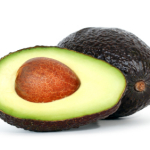 Lots of people avoid avocados because they believe that they are full of fat and therefore calories. Well, they do have a high fat content but it is a healthy fat. It is predominantly monounsaturated and can help to lower LDL, ‘bad’, cholesterol.
Lots of people avoid avocados because they believe that they are full of fat and therefore calories. Well, they do have a high fat content but it is a healthy fat. It is predominantly monounsaturated and can help to lower LDL, ‘bad’, cholesterol.
So, infact, avocados could be considered to be a heart-friendly food. Not only do they have the good oils, but they also contain other nutrients that are good for the heart such as the antioxidants vitamin C and E, and also potassium.
Vitamin C helps to keep the immune system healthy as it is a great antioxidant and antihistamine. It helps with the absorption of iron and the production of collagen. It helps to resist bacterial and viral diseases, controls blood cholesterol levels, is important for normal brain and nerve function and also in tooth and bone formation.
Vitamin E is another anti oxidant, but in addition it reduces the oxygen requirement of muscles and organs, acts as an anti blood-clotting agent, dissolves blood clots, improves blood supply around the body and strengthens blood capillary walls. Vitamin E improves the action of insulin in diabetes, increases the proportion of HDL (good) cholesterol and increases the ability of white blood cells to resist infection.
Potassium, together with sodium and chloride, is an electrolyte and a proper balance of all three is important for nerve function, muscle contraction, fluid balance and acid-alkali balance. Potassium helps to lower blood pressure and if the potassium levels fall too low in relation to sodium levels this will tend to increase blood pressure.
Other nutrients include Lutein a carotenoid which is good for the maintaining eye health and when added to a salad avocados help to increase the absorption of other carotenoids such as beta carotene and lycopene.
Lycopene is a bright red carotenoid phytochemical found in tomatoes and other red fruit and vegetables such as carrots, watermelons and papayas. Unlike other fruit and vegetables, where nutritional content is diminished upon cooking, the bioavailability of lycopene increases with cooking, and tomato paste is 4 times more bioavailable than fresh tomatoes. Adding oil to tomatoes will help the assimilation of lycopene from the digestive tract into the blood stream as it is insoluble in water and tightly bound to the vegetable fibre.
B Vitamins are also present in avocados and known as nature’s tranquilliser. They help in stressful situations but need replenishing daily as they are water soluble.
An avocado is a great alkalising fruit, it helps to keep the body alkaline which is so important for optimum health. The entire metabolic process depends on an alkaline environment. It is at the root of all sickness and disease, but when the body is in healthy alkaline balance, it works well, germs are unable to get a foothold, and you can boost your immunity.
It is important to increase the amount of alkaline-forming foods you consume as these foods can help restore your pH balance, as well. Try to eat more fresh fruits and vegetables. Avoid dairy foods, sugary snack foods and processed items.
